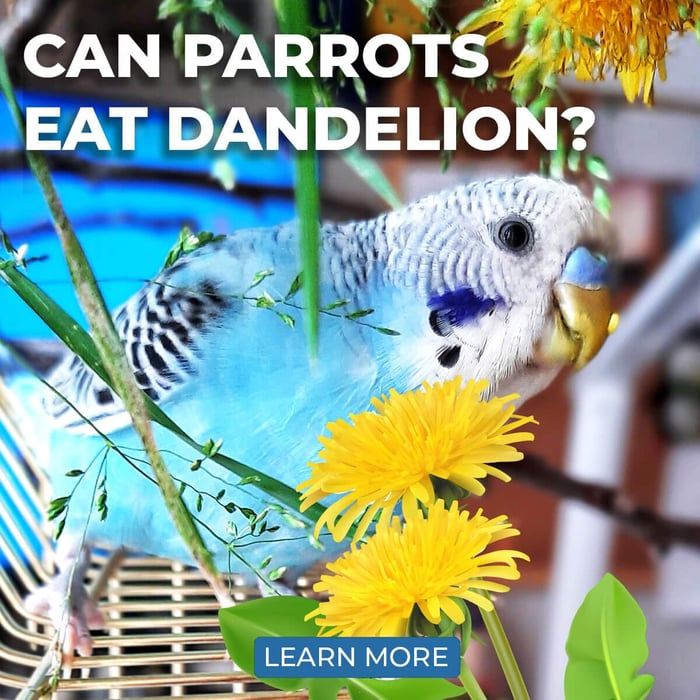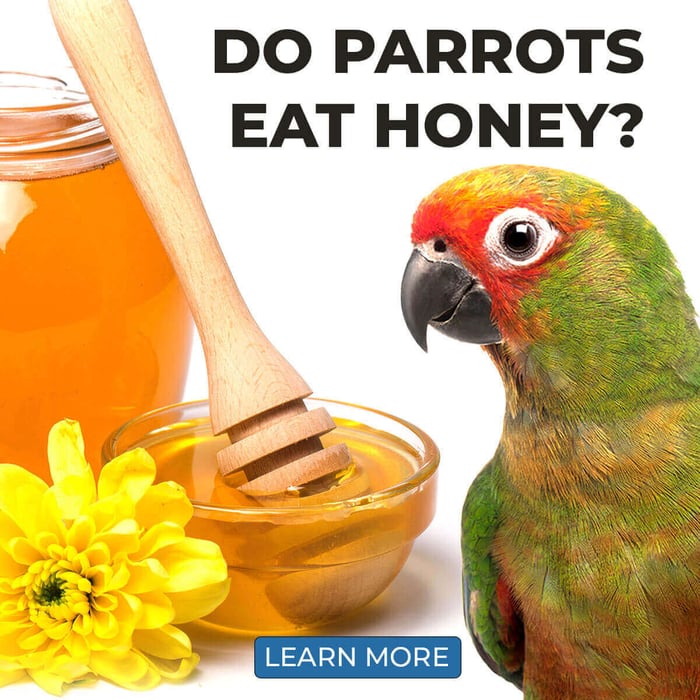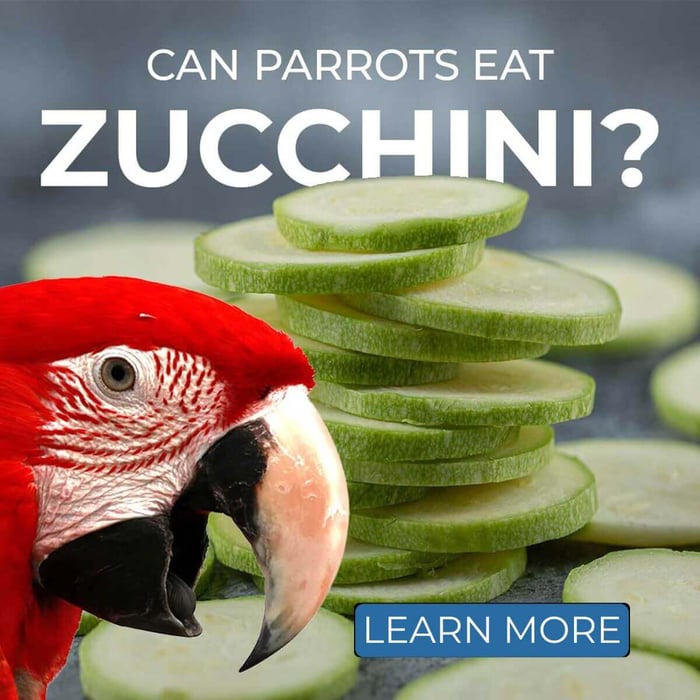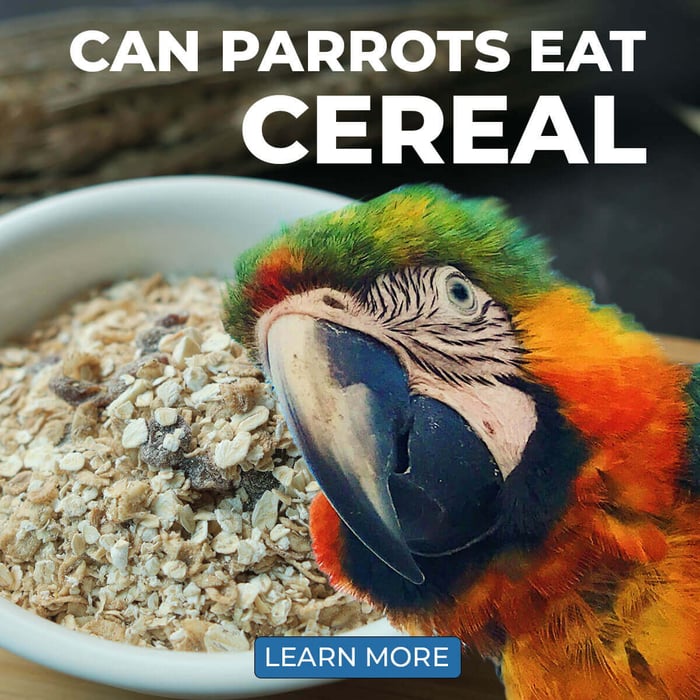Can Parrots Eat Peanuts? The Great Peanut Controversy
If you've been a parrot owner for a while, you may have heard mixed opinions on whether feeding peanuts to your bird is a good or bad idea. Some parrot owners avoid peanuts like the plague, while others have been feeding them for decades without issue. What's behind this great peanut controversy? Can parrots eat peanuts, or are you better off finding other types of snacks for your bird? Let's find out!
Why Do People Say Peanuts Are Bad for Parrots?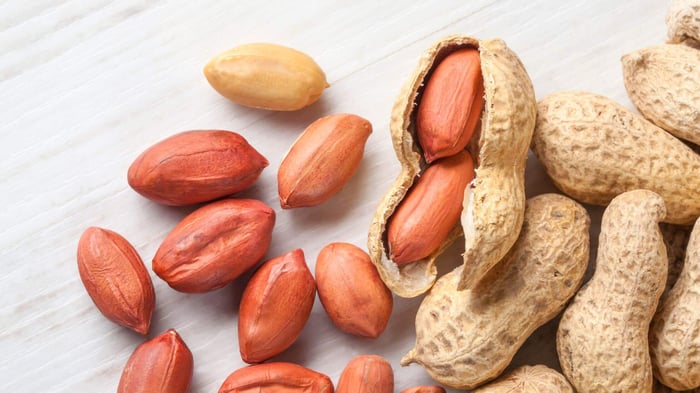
The reason you'll find many parrot enthusiasts recommending against feeding your peanuts to your parrot is a little thing called aflatoxin. Or rather, aflatoxins—the name refers to a collection of mycotoxins, or toxins that are produced by fungi.
The Aspergillus fungus produces aflatoxin, which may contaminate various globally important foods for humans and animals, such as hay, rice, wheat, and others. Additionally, peanuts, particularly those sold in the shell, are also susceptible to Aspergillus contamination. This presents a double danger: Aspergillus spores themselves can make your parrot sick with a nasty respiratory illness called aspergillosis, while the aflatoxins can cause severe liver problems.
We've already talked extensively about Aspergillus and its dangers in the post on aspergillosis in parrots. Your bird can potentially develop aspergillosis from poorly stored food, and this disease often links to peanuts. However, peanuts don't inherently pose more risk; rather, their frequent poor storage conditions lead to this association.
That brings us to the next question…
Toxic Peanuts: Truth or Myth?
Reading the above, you might feel inclined to keep your parrot as far away from peanuts as possible. However, this reaction may not be necessary. Consider this transition: reputable parrot food brands such as Tidymix and Hagen, renowned for their extensive research into parrot nutrition and welfare, incorporate peanuts into their mixes. Buckton's brand even sells parrot food mixes with unshelled peanuts.
What accounts for this discrepancy? We've already discussed that poorly stored foods, such as items that have become wet, are often linked with Aspergillus mould and the resulting aflatoxins. This issue affects a variety of foods, including typical parrot seed mixes. Consequently, it's important to note that peanuts are not to blame.
From the above, it logically follows that as long as you opt for properly stored peanuts, your bird can eat them just fine. Hence, the parrot food brands above don't make birds ill; they maintain high-quality standards for their ingredients and packaging. The same doesn't always apply to cheap peanuts sold in bulk.
Parrot Essentials tip: You should know what a sick parrot looks like. Even if your parrot hasn't eaten peanuts, symptoms like lethargy, vomiting, and refusal to eat can be signs of aflatoxin poisoning or other serious issues. Don't wait, call your avian vet if your bird is acting odd!
So, Can Parrots Eat Peanuts or Not?
In short? Yes, parrots can eat peanuts, as long as you buy a trusted parrot food brand or human-grade peanuts.
Avoid nuts that are salty, with seasonings or fried peanuts—those are for humans, not parrots. It's best to buy roasted rather than raw. Shelled peanuts don't become contaminated as easily, but we personally do like offering our parrots unshelled ones, as they encourage foraging behaviour. We just make sure they come from a reputable source that adheres to strict quality control.
For safety reasons, you should always throw out peanuts (and any parrot food, as well as human food, for that matter) out if they've gotten wet. Foods should be stored in cool and dry. Aspergillus mould thrives in warm and humid conditions. Ventilation is important. If you don't trust it, just toss it.
Should Parrots Eat Peanuts?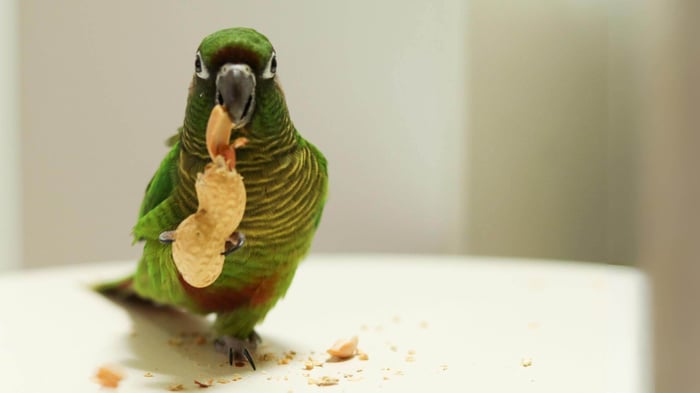
The next question is, should your parrot be eating peanuts in the first place? After all, these nut-like legumes are very high in calories and not very nutritionally dense. They aren't exactly full of vitamins.
Well, peanuts shouldn't form part of your parrot's daily diet. Feeding large amounts of nuts and seeds is an outdated practice that veterinarians now agree leads to obesity and malnutrition in our pet birds, which is why we recommend a diet based on high-quality pellet food here at Parrot Essentials.
But as a (training) treat, or to encourage foraging using peanuts in the shell? Absolutely fine in small amounts. Larger parrots can have a quarter nut at a time, while for small birds, you can chop the peanuts into small pieces.
Parrot Essentials tip: If you're still not a fan of the idea of feeding peanuts to your parrot, that's fine; you don't have to. They're absolutely not an essential part of our birds' diets. Even when it comes to treats, there are more nutritional options, such as walnuts or almonds. Like peanuts, these can be offered in the shell to encourage foraging, although you may have to help smaller parrots to open them.
Exploring Alternative Treats for Parrots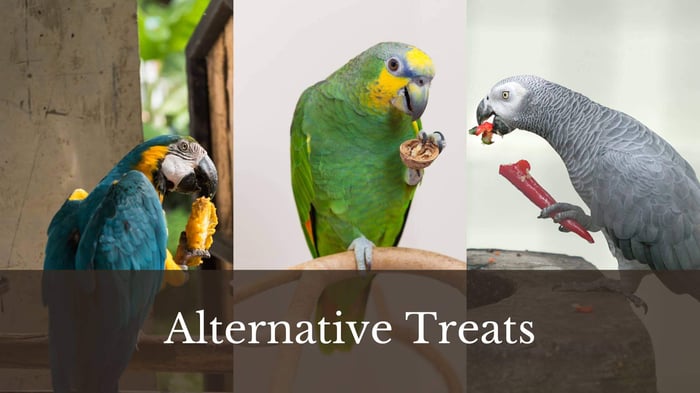
If you decide to avoid peanuts, there are numerous other treats that are both healthy and enjoyable for your parrot. For instance, fruits such as apples, berries, and mangoes are excellent sources of vitamins and antioxidants. Ensure that these fruits are free of seeds and pits, as some can be toxic to parrots.
Vegetables are another great option. Carrots, bell peppers, and leafy greens like spinach and kale are packed with essential nutrients. These can be offered raw or lightly steamed to preserve their nutritional value.
Nuts other than peanuts can also be included in your parrot's diet in moderation. Almonds, walnuts, and pecans are good choices. They should be given in small amounts due to their high fat content, but they can provide beneficial omega-3 fatty acids and proteins. Always opt for unsalted and unseasoned nuts to avoid any adverse health effects.
Ensuring a Balanced Diet for Your Parrot
A well-balanced diet for a parrot goes beyond just treats. The primary component should be a high-quality pellet formulated specifically for parrots. These pellets are designed to provide all the essential nutrients that your parrot needs.
Additionally, incorporating a variety of fresh foods is crucial. Fresh fruits, vegetables, and a limited amount of seeds and nuts can round out your parrot's diet. It's important to avoid overfeeding any single type of food, as variety ensures that your parrot gets a range of nutrients.
Monitoring your parrot's weight and health is also essential. Regular check-ups with an avian vet can help detect any nutritional deficiencies early and allow for adjustments in diet as needed.
Conclusion
So, Can Parrots Eat Peanuts? While the debate over feeding peanuts to parrots continues, the key lies in quality and moderation. Properly stored, high-quality peanuts can be a safe treat for parrots, but they should not be a staple in their diet. Exploring alternative treats and ensuring a balanced diet will contribute to the overall health and well-being of your feathered friend. Remember, the well-being of your parrot hinges on informed decisions and attentive care.

